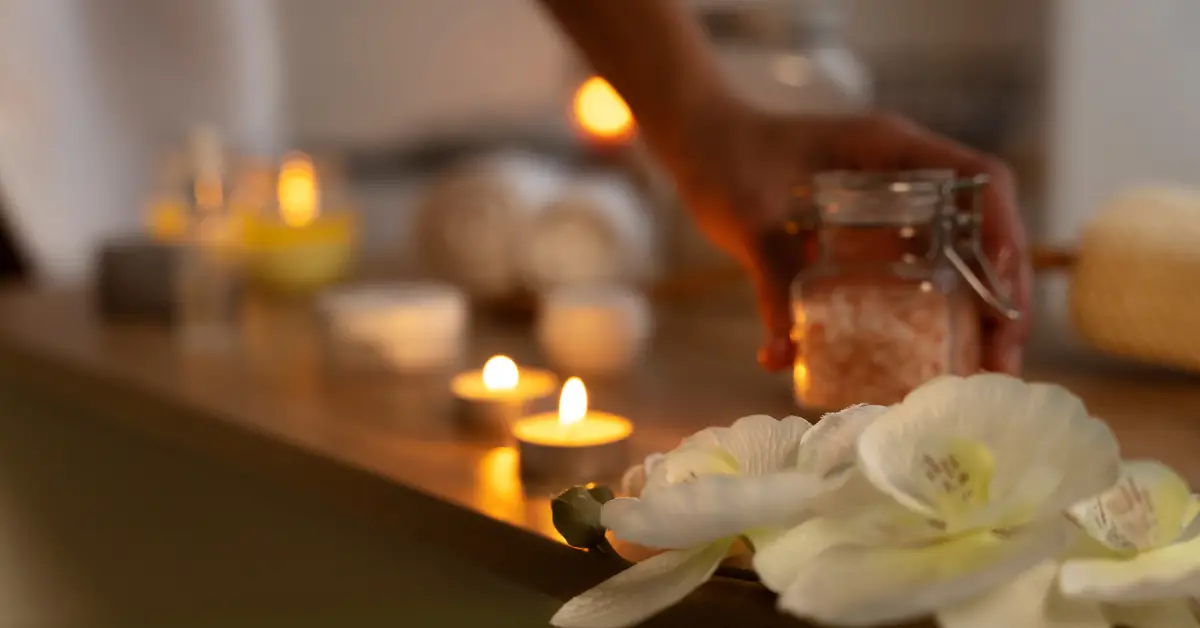Living a stress-free life in today’s world may seem like an elusive goal. However, with the right mindset and strategies, stress levels can be reduced and managed effectively.
This post shows you eleven ways to help you live a better, stress-free life. Let’s dive right in!
Busy? Save this pin for later.
1. Prioritize Self-Care
Self-care is crucial for maintaining mental and physical well-being. Taking time out of your busy schedule to engage in activities that rejuvenate you is essential. Here are some ways you can prioritize self-care:
Exercise: Engaging in regular physical exercise not only improves your physical health but also boosts your mood by releasing endorphins, the natural mood-boosting chemicals in your brain. Consider activities such as brisk walking, jogging, or yoga.
Meditation: Practicing meditation helps calm your mind and promotes relaxation. Set aside a few minutes each day to sit quietly and focus on your breath. This can help reduce stress and increase your ability to handle daily challenges.
Mindfulness: Incorporate mindfulness into your daily routine by practicing mindfulness techniques such as deep breathing exercises, meditation, or mindful eating. These practices can help you stay present in the moment and find inner calm amidst the chaos.
Adequate Sleep: Getting enough sleep is crucial for your overall well-being. Prioritize a consistent sleep schedule and create a relaxing bedtime routine to ensure you get the rest your body and mind need.
You Might Also Like: 50 Inspirational Life Quotes to Brighten Your Day
2. Practice Time Management
Poor time management often leads to increased stress levels. Taking control of your time can significantly reduce stress. Here are some strategies you can implement to practice effective time management:
Create a Schedule: Start by creating a schedule or to-do list that breaks down your tasks and prioritizes them. This will help you stay organized and focused on what needs to be accomplished.
Set Realistic Deadlines: Be mindful of setting realistic deadlines for your tasks. Avoid overcommitting yourself and allow enough time for each task to be completed thoroughly.
Allocate Specific Time Slots: Allocate specific time slots for different activities, whether it’s work-related tasks, personal activities, or relaxation time. This will help you structure your day and ensure that you have time for everything that’s important to you.
Minimize Procrastination: Procrastination can lead to unnecessary stress. Identify your procrastination triggers and find ways to overcome them. Break tasks into smaller, manageable steps to make them less overwhelming.
3. Foster Supportive Relationships
Building and supporting relationships is crucial to emotional health. Surrounding yourself with positive and likeable people can help reduce stress. Here are some ways to build social support:
Seek Positive Influences: Seek out friends and family members who offer encouragement, understanding, and a listening ear. Surrounding yourself with positive influences can help you maintain a positive mindset and reduce stress.
Join Support Groups: Consider joining support groups or engaging in activities that connect you with people who share similar interests or experiences. This can provide you with a sense of belonging and support.
Practice Active Listening: Cultivate strong, supportive relationships by actively listening to others. Show empathy and understanding when someone shares their thoughts or concerns. This can strengthen your connections and reduce misunderstandings.
Offer Support: Be there for your loved ones when they need support. Offer a helping hand, lend a listening ear, or provide words of encouragement.
4. Develop Healthy Coping Mechanisms
Stressful situations inevitably occur, but how we respond to them can have a big impact. Developing a healthy lifestyle can help you manage stress effectively. Here are some tips you can incorporate into your life:
Deep Breathing Exercises: Deep breathing exercises can help calm your mind and body. Practice deep breathing by inhaling deeply through your nose, holding your breath for a few seconds, and then exhaling slowly through your mouth. This can help reduce stress and promote relaxation.
Journaling: Writing down your thoughts and emotions in a journal can be a therapeutic way to process your feelings. It provides an outlet for self-expression and can help you gain perspective on stressful situations.
Talk to a Trusted Friend or Therapist: Sharing your concerns with a trusted friend or therapist can provide you with support and alternative perspectives. They can offer guidance and help you explore effective solutions to manage stress.
Engage in Creative Outlets: Engaging in activities such as painting, playing a musical instrument, or engaging in crafts can serve as a creative outlet for stress. These activities allow you to focus your mind on the present moment and provide a sense of calm.
5. Embrace a Positive Mindset
Cultivating a positive mindset can transform how you perceive and respond to stressors. Here are some strategies to embrace a positive mindset:
Practice Gratitude: Focus on the things you are grateful for each day. Take a few moments to reflect on the positive aspects of your life, no matter how small. This can shift your focus away from stressors and promote a sense of well-being.
Challenge Negative Thoughts: Negative thoughts can amplify stress. Challenge negative thoughts by replacing them with positive affirmations. Remind yourself of your strengths, accomplishments, and the positive aspects of challenging situations.
Surround Yourself with Positivity: Surround yourself with positive influences, whether it’s uplifting books, motivational podcasts, or supportive friends. Fill your environment with positivity to maintain an optimistic outlook.
Practice Self-Compassion: Be kind to yourself and practice self-compassion. Treat yourself with the same kindness and understanding you would offer to a loved one.
6. Engage in Physical Activity
Physical activity is not only beneficial for your physical health but also for managing stress. Here are some ways you can engage in physical activity:
Regular Exercise: Aim for at least 30 minutes of moderate-intensity exercise daily. This can include activities such as brisk walking, jogging, cycling, swimming, or yoga. Choose activities that you enjoy to make your exercise routine more sustainable.
Outdoor Activities: Spending time outdoors and connecting with nature can have a positive impact on your mental well-being. Consider activities such as hiking, gardening, or playing a sport in nature to reduce stress and promote relaxation.
Mindful Movement: Engage in mindful movement practices such as yoga or tai chi. These practices not only provide physical benefits but also help you focus on the present moment and cultivate a sense of calm.
You Might Also Like: Powerful Tips for Choosing Clothes That Flatter Your Figure
7. Establish Boundaries
Setting boundaries in both personal and professional relationships is crucial for maintaining a stress-free life. Here are some tips for establishing healthy boundaries:
Learn to Say No: Recognize your limits and learn to say no when necessary. Prioritize your own well-being and avoid overcommitting yourself. Saying no allows you to focus on what truly matters to you.
Communicate Clearly: Communicate your boundaries clearly and assertively. Let others know what you are comfortable with and what you need. Effective communication ensures that others respect your boundaries.
Prioritize Self-Care: Establish boundaries that prioritize self-care. Make time for activities that rejuvenate you and ensure that your own well-being is not compromised.
8. Practice Mindfulness
Mindfulness involves being fully present in the moment and non-judgmentally observing your thoughts and feelings. Here are some ways to practice mindfulness:
Deep Breathing Exercises: Incorporate deep breathing exercises into your daily routine. Take a few moments to focus on your breath and let go of any racing thoughts. This can help you stay present and reduce stress.
Meditation: Set aside a few minutes each day to practice meditation. Find a quiet space, sit comfortably, and focus your attention on your breath or a chosen anchor. This can help calm your mind and promote relaxation.
Mindful Eating: Practice mindful eating by paying attention to the taste, texture, and aroma of your food. Slow down and savor each bite. This can help you develop a healthier relationship with food and reduce stress-related overeating.
9. Seek Professional Help
If stress becomes overwhelming or persists for an extended period, seeking professional help is essential. Here are some reasons to consider seeking professional help:
Guidance and Support: A mental health professional can provide guidance, support, and personalized strategies to manage stress effectively.
They can help you explore the underlying causes of stress and develop coping mechanisms tailored to your specific needs.
Identify Underlying Causes: A mental health professional can help you identify any underlying causes or triggers of stress that may require further attention. They can assist you in addressing these root causes for long-term stress reduction.
Personalized Strategies: Professionals can offer personalized strategies and techniques based on their expertise and experience. They can provide you with tools to manage stress effectively and improve your overall well-being.
10. Engage in Relaxation Techniques
Relaxation techniques offer an effective way to counteract stress and promote a sense of calm. Here are some relaxation techniques you can try:
Progressive Muscle Relaxation: Progressive muscle relaxation involves tensing and releasing different muscle groups to promote relaxation.
Start from your toes and work your way up to your head, progressively relaxing each muscle group.
Guided Imagery: Guided imagery involves visualizing calming and peaceful scenes to promote relaxation. Find guided imagery recordings or create your own mental imagery to transport yourself to a serene environment.
Aromatherapy: Explore the use of essential oils or scented candles to create a calming atmosphere. Lavender, chamomile, and ylang-ylang are known for their relaxation properties. Experiment with different scents to find what works best for you.
11. Practice Effective Communication
Clear and effective communication plays a vital role in reducing stress in interpersonal relationships. Here are some tips for practicing effective communication:
Express Your Needs: Learn to express your needs, thoughts, and concerns openly and assertively. Use “I” statements to communicate how you feel without blaming or criticizing others.
Actively Listen: Actively listen to others by giving them your full attention and seeking to understand their perspective. Show empathy and validate their feelings.
Strive for Empathy and Understanding: Cultivate empathy and understanding by putting yourself in the other person’s shoes. This can help reduce misunderstandings and conflicts.
Resolve Conflicts: Address conflicts in a constructive manner by focusing on finding solutions rather than dwelling on the problem. Use effective communication techniques such as active listening, compromise, and problem-solving.
By fostering healthy communication, you can minimize misunderstandings, resolve conflicts, and cultivate stronger, stress-free connections.
Living a stress-free life requires dedication and the right strategies. Prioritizing self-care, managing time effectively, encouraging social support, and developing healthy habits are just a few ways to reduce stress.
Maintaining a positive mindset, participating in physical activity, setting boundaries, and practicing positive attitudes contribute to a healthy, stress-free lifestyle.
It is important to seek help when needed, and combining relaxation techniques with good communication skills can improve overall health. Using these eleven methods, you can empower yourself to live a stress-free, fulfilling life.
You Might Also Like: How to Express Your Feminine Power Through Fashion















Leave a Reply
You must be logged in to post a comment.